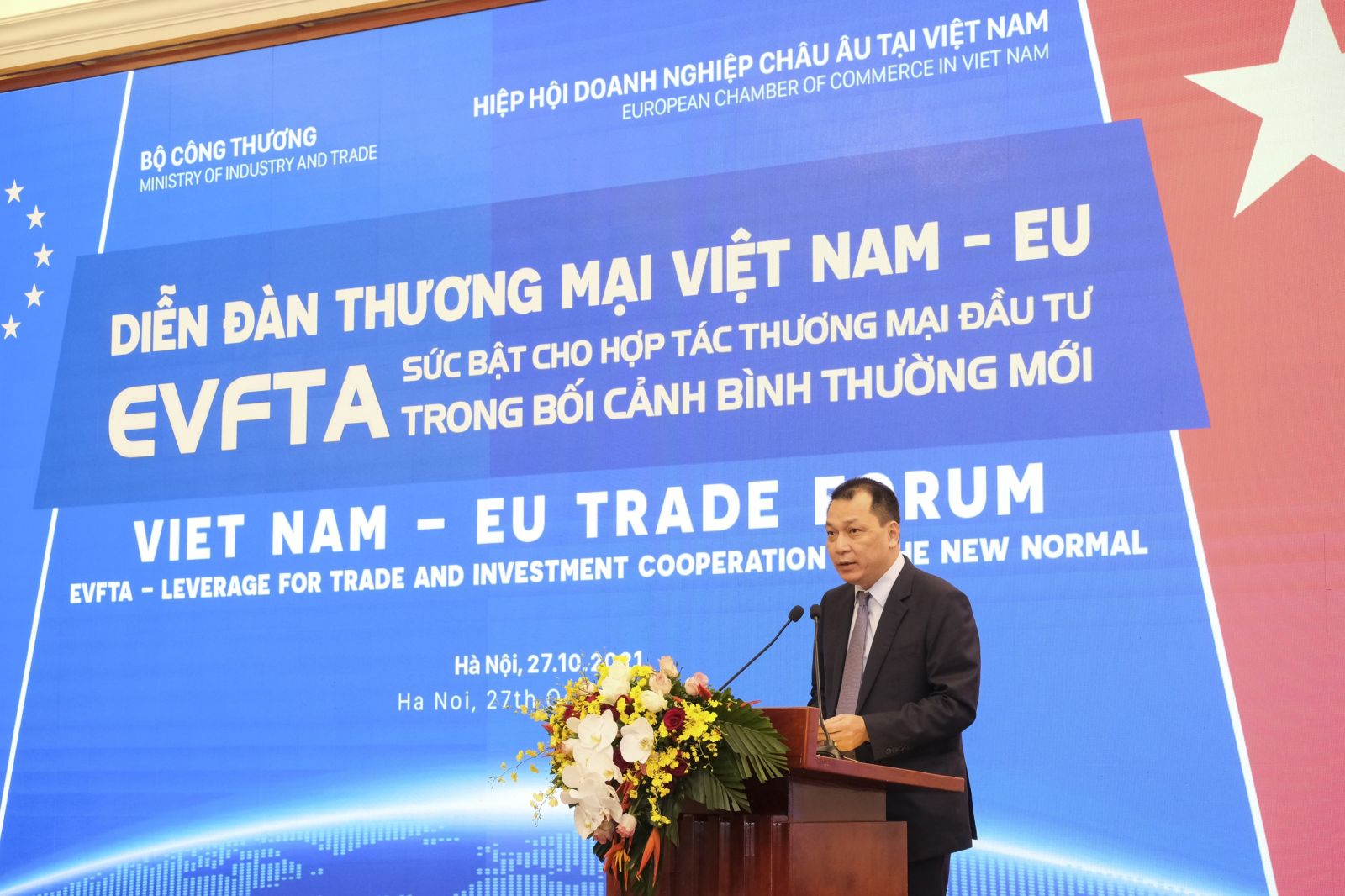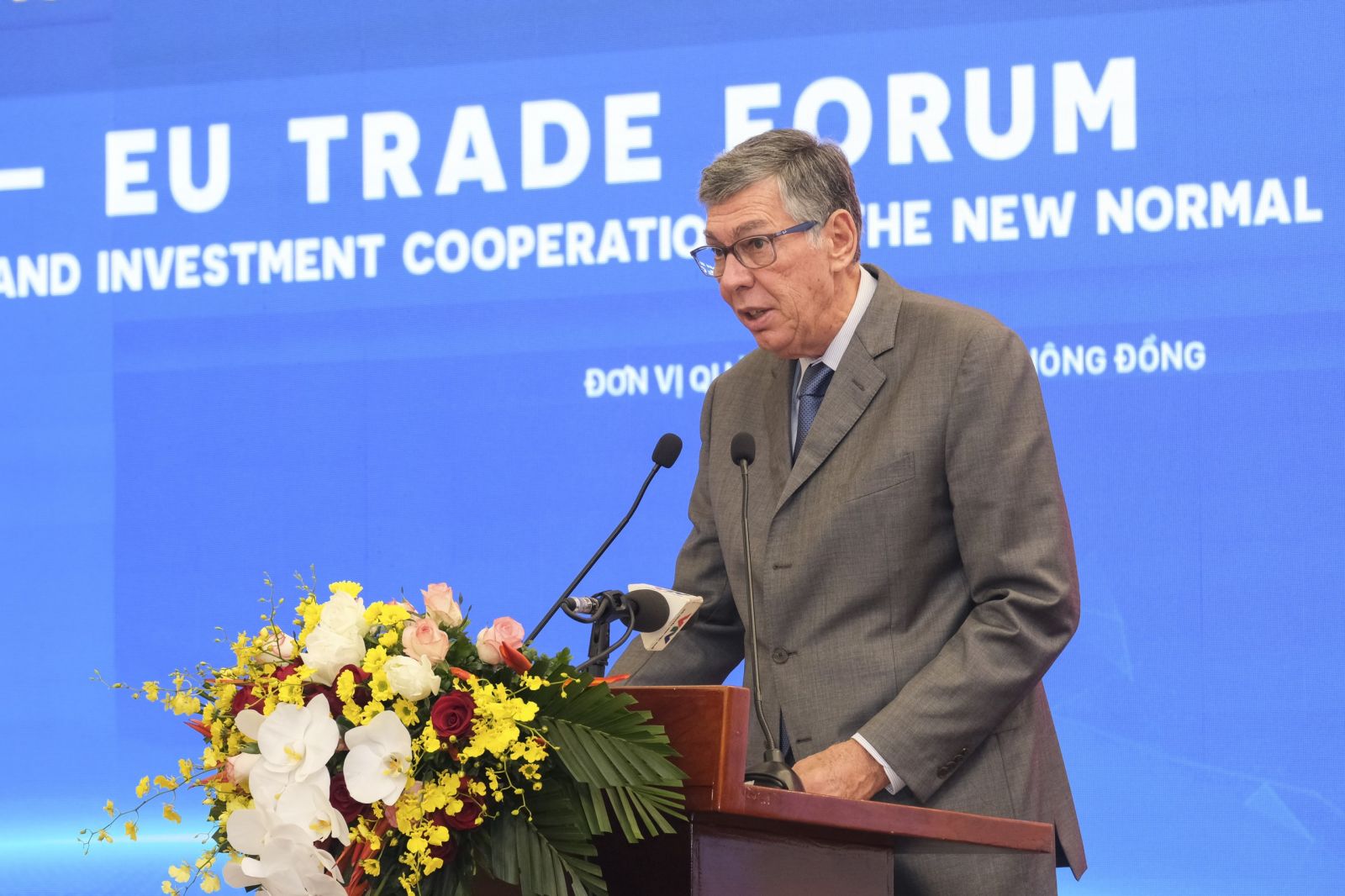EVFTA provides platforms for businesses to navigate Covid-19 impacts
The EU-Vietnam Free Trade Agreement (EVFTA) and the upcoming EU-Vietnam Investment Protection Agreement (EVIPA) would lay the foundation for Vietnam to continue attracting foreign direct investment (FDI) from Europe.
The EVFTA has not only served as the leverage for bilateral trade but also a platform for businesses from both sides to navigate the severe Covid-19 economic impacts.
| Vice Minister of Industry and Trade Dang Hoang Anh. Source: MoIT |
Vice Minister of Industry and Trade (MoIT) Dang Hoang Anh stressed the view at the Vietnam-EU Trade Forum held today [October 27], discussing the impacts of the trade deal for trade and investment cooperation between Vietnam and the EU in the new normal.
One year after the EVFTA became effective, trade turnover between Vietnam and the EU stood at US$54.87 billion in 2020, an increase of 12.1% year-on-year. Of the total, Vietnam exports goods worth $38.48 billion to the EU, a rise of 11.3%, and imports of $16.39 billion, up 14.04%.
Amid the fourth Covid-19 outbreak, the trade revenue during the nine-month period remained resilient and rose by 13.4% year-on-year to $41.3 billion, with Vietnam’s export turnover standing at 28.85 billion, going up by 11.7% and imports of $12.4 billion, up 17.6%.
“More and more Vietnamese enterprises have been able to utilize preferential treatments from the EVFTA via the certificate of origin (C/O),” Anh said, noting Vietnam has become EU’s largest trading partner in the ASEAN and among the bloc’s top 10 export market.
According to Anh, amid the recovery of the global economy and the emergence of new investment trends, the EVFTA would open up opportunities for Vietnamese firms and their European peers to join the restructuring process of regional and international supply chains.
“Throughout this process, both sides would be able to access new resources and modern technologies to create new breakthroughs for sustainable development,” he added.
“More than ever, local businesses should adapt to the new situation and grasp opportunities as the world is moving to the post-Covid-19 period. The MoIT and networks of trade missions in EU are committed to supporting businesses from Vietnam and the EU utilizing the trade deal for greater trade and investment cooperation,” Anh said.
Anh said the high-level standards stipulated in the EVFTA are putting pressure on local businesses to adopt a more long-term business strategy rather than just pursuing short-term gains from lower tariffs.
“Vietnamese firms are paying more attention to social responsibilities or green consumption as the way to stay long-term in the EU market,” he said.
| EuroCham Chairman Alain Cany. |
Meanwhile, President of the Vietnam International Arbitration Center (VIAC) Vu Tien Loc noted the EVFTA has given Vietnam a considerable advantage compared to its direct competitors in the EU market.
“In addition to Vietnam, the EU only has similar trade deals with three Asian countries of Japan, South Korea, and Singapore, but none of them are competing directly with Vietnam’s main export products such as garment, farm produce or seafood,” Loc added.
At the meeting, Chairman of the European Chamber of Commerce (EuroCham) Alain Cany stressed the necessity for both sides to cooperate and address shortcomings for mutual benefits.
Cany suggested the EVFTA and the upcoming EU-Vietnam Investment Protection Agreement (EVIPA) would lay the foundation for Vietnam to continue attracting foreign direct investment (FDI) from European investors, those that are looking for a stable, safe, and competitive destination in the post-pandemic period.
The EuroCham Chairman expressed his optimism towards Vietnam’s economic prospects and the Vietnam-EU trade relations during the new normal while calling for the Vietnamese Government to ensure the smooth transition in its Covid-19 strategy for safe and flexible adaptation.
The move would help Vietnam stay close to the global economic recovery process, he added.
On this occasion, the MoIT launched a manual on the EU’s import regulations in a bid to further raise public awareness on the EVFTA and support Vietnamese businesses penetrating the EU market.














